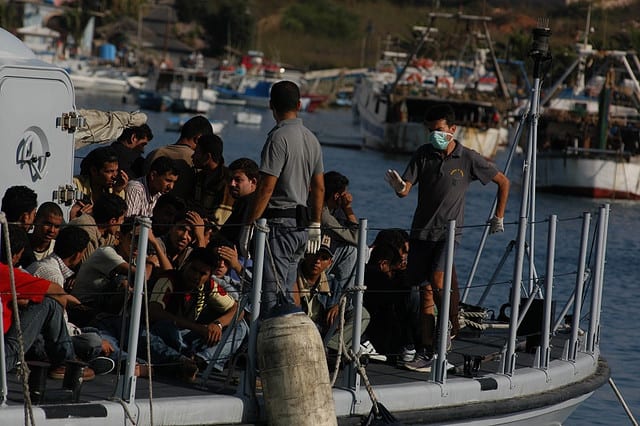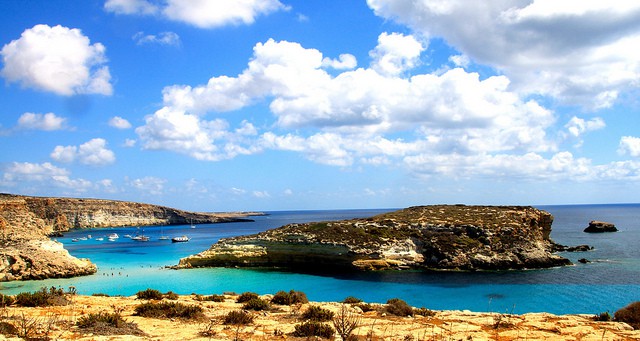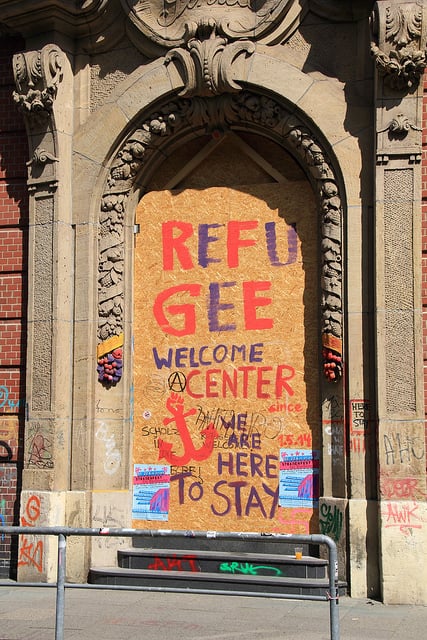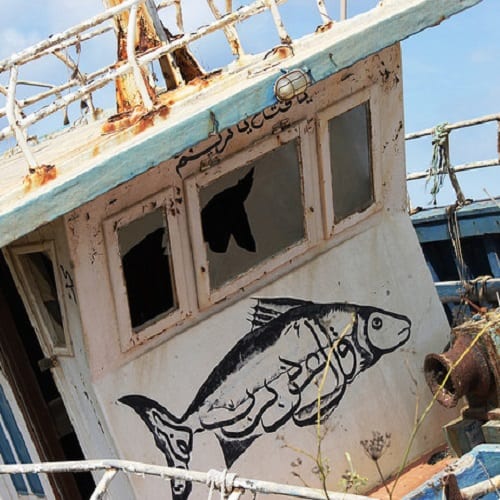On April 19 I went to see “Lampedusa”, a play by Anders Lustgarten, and found it both enlightening and misleading. Enlightening because it strives to make spectators think through the connections between how people are being left to die at Europe’s borders, and how migrants (and the poor) are scapegoated and exploited within European countries. Opening a discussion around these connections is crucial if we wish to seriously address (and end) deaths at Europe’s borders. However, Lustgarten’s depiction of people’s scope for choice and action in Lampedusa is misguided. Unveiling the play’s inaccuracies could go further in building an understanding of possibilities for change when it comes to migration.
On April 19 between 700 and 900 people drowned off the Libyan coast. The main political debate concerning migrant deaths that has been unfolding in the aftermath of this enormous loss of life has centred on bringing back a Mare Nostrum style rescue mission. Mare Nostrum, the Italian military operation that took place in the Mediterranean in 2014, is undoubtedly preferable to Triton, the current EU border control mission. It had a bigger operational capacity and could therefore save more lives. Still, between January and September 2014, and thus during Mare Nostrum, at least 3072 people died. Despite their rescue operation status, both Mare Nostrum and Triton (even in its reinforced version resulting from the European Council meeting of April 23) should be understood as missions driven by a will to stop departures. Hence the heavy focus on combatting smugglers – the EU recently announced carrying out military attacks in Libya supposedly to this end – and the reinforcement of ties with police forces in countries of departure, such as Egypt and Tunisia. These measures do not aim to ensure safe travelling conditions. And they do not address the causes of migration. They are not the solution.

Striving to implement alternatives to these missions is vital. The proposition of opening up legal travel possibilities towards Europe from Libya could (and should) be picked up immediately. As for the long-term, rethinking the visa system and making freedom of movement a reality seem to me the only ways to end deaths at the border. Politicians in Europe, though, are not considering these options, and European citizens did not take to the streets to demand change in migration laws following the deaths of thousands at Europe’s maritime frontier.
Despite the unbearable facts being widely available, opening the doors to Fortress Europe is a possibility that remains largely ignored by both governments and publics.
So where to start in thinking through change? Perhaps we could momentarily shift our gaze away from governments and publics to individuals. “Lampedusa” (the play) tells the stories of personal change of two fictional characters. One, Stefano, is a Lampedusan fisherman turned coastguard, the other, Denise, is a British-Chinese woman living in Leeds and working for a payday loan company. Both characters become friends with individuals whose realities are heavily influenced by laws and policies that make some lives valuable, and others worthless. Change happens gradually. It becomes apparent when the characters must choose whether to act in the face of situations they now consider unjust.

However, the play is misleading precisely because it removes the question of how people make choices, and act upon them, from their context. In “Lampedusa” we learn that Stefano comes from a long line of fishermen in Lampedusa, and used to be one until there weren’t enough fish left to make ends meet. After three years of unemployment, he decides to join the coastguard. His new job is “to fish dead migrants out of the sea.” Stefano then strikes a friendship with Modibo, a mechanic from Mali, which makes him question his views on migration. When Modibo tells him his wife is on a boat heading from Libya to Lampedusa, Stefano decides to go to the rescue despite an impending tempest.
By romanticising the character of Stefano, the play de-politicises the context in which he operates. For one, Stefano’s choice of going from being a fisherman to being a coastguard is strange. Coastguards working in Lampedusa come from all over Italy; they are not from Lampedusa itself. More worryingly though, the play would have us believe that in Lampedusa there is a job post within the coastguard that involves recovering the dead from the sea. This job post does not exist. The Italian state does not automatically send coastguards to search for and salvage the dead. Of course, when confirmed shipwrecks occur, or when a dead person is signalled at sea, the coastguards intervene.
Yet in a huge number of cases it is people who have nothing to do with the state, police bodies, or with official rescue operations – such as fishermen, merchant ships, tourists, members of civil society – who rescue both the living and the dead.
Currently, under Triton, coastguards cannot rescue boats – let alone the dead – beyond 30 miles from Lampedusa. As a result, they call upon civilian vessels to do the rescuing for them and to take people either directly to Lampedusa or within the 30 miles range. Things were not so different during the much-praised Mare Nostrum operation. In 2014, merchant ships and other privately owned vessels rescued 30,000 people. Civilian boats are not given any training or financial support, nor are they provided with extra life jackets, water and other means to successfully carry out rescue at sea. Ship owners and fishermen have to interrupt their work when asked to rescue migrant boats, thereby losing time and money. On top of this, on several occasions fishermen have been arrested for having helped migrants in distress at sea under the accusation of aiding illegal immigration.

Within this complex context, Stefano’s decision to go out in the tempest to rescue his friend’s wife would have been a lot less straightforward than Lustgarten’s play would have it. The playwright missed an opportunity to expose the intricate maze within which people form decisions. The details that make up this maze are important. Coastguards (and the Guardia di Finanza) are officially meant to manage migration, while locals in Lampedusa are presumably kept out of the execution of migration laws. The reality on the ground though shows that the inhabitants of the border are made to become heavily involved in the management of migration while having no support nor a say in it.
What is more, rescue at sea has been made into both a burden and a risk for civilians. It is important to understand these structural constraints to thinking and acting according to one’s moral assessments. Hence why the inaccuracies in Lustgarten’s play matter: they prevent us from seeing the bigger picture within which people form value judgements and actions.
We are living at a time in which we are all aware that people are dying in the thousands at our frontiers, and yet governments continue avoiding the real solutions. Asking ourselves how our own choices are influenced by those same laws that are keeping people out might be the key to exploring possibilities for change. Understanding that laws have a direct, albeit at times unintended, impact on individual decision-making possibilities might lead us to question the values that lie at the heart of certain policies. This, in turn, might lead to productive struggles over value, which could lead to change. Anthropologist David Graeber, whose theory of value informs what I mean here by ‘struggles over value’, argues that “social theory is at something of an impasse, in part, because it has boxed itself into a corner where it is now largely unable to imagine people being able to change society purposefully.” (2001:230) He proposes that to move beyond this rut, we should understand value “as how people measure the importance of their own actions within such structures” (2001:230). If struggles over value are about creating who we are and the social world we live in, then there is space for creative refusal, resistance, and for living by other values.
It is crucial to recognise that deaths at Europe’s borders are a direct effect of migration laws, and that those laws inform a broader value system within which certain lives are dispensable. Change in migration laws and policies must happen at state level and at European Union level. In order for populations within those states to push for this change, understanding that what is at stake is how their own lives are being valued and framed is vital.
Reference
Graeber, David. 2001. “Chapter 7: The False Coin of our own Dreams, or the Problem of the Fetish, IIIB.” In Toward an Anthropological Theory of Value: The False Coin of Our Own Dreams. New York: Palgrave.






Thanks Valentina. Very interesting stuff. Perhaps it’s not clear in the text but Stefano is working as a coastguard during the Mare Nostrum era–the mass drowning that unhinges him is the one in October 2013. It’s not his actual ‘job’ to fish the dead out of the sea, that’s only how he sees it. The reality of the play suddenly intruded on the performance in quite an incredible way…
The play is transferring to the main stage of the Soho from June 29 to July 25 (spread the word!) so are there any small tweaks you’d suggest to correct the problems you see? Obviously it’s pretty hard to dramatise bureaucratic decisions, especially in a monologue which requires constant dramatic drive, and I don’t want to lose the sense of individual agency and kindness, but I’d be interested in your thoughts.
I completely agree that the fundamental problem is the causes of migration, particularly Western intervention via development banks and support for dubious regimes. I wrote an article on it, actually: http://www.theguardian.com/commentisfree/2015/apr/17/refugees-eu-policy-migrants-how-many-deaths
Best,
Anders
This article explains what I felt was misguided about the play. There is no questioning the playwright’s talent and immense ability to tell two powerful stories of human frailty. But I expected a political dilemma and to learn about Lampedusa. I was disappointed that the stories had happy endings. It seemed ridiculous that the fisherman went out in a storm,would’ve found the boat After surviving a ‘tower block’ of a wave – found the wife alive and recognise her. It went a bit Disney I’m afraid. Denise’s arc felt more real and relatable – and more mired in political motive. A collection for refugees at the end of the play would be a nice touch. Both performances were outstanding. I still give the play 4.5 stars for masterful storytelling.
Disney and dramatic licence aside there is a ray of hope if we have people writing and producing quality work which breaks the acquiescence consensus. I saw his done in the Citizens Theatre where unemployed people could still get in for two quid. Words are always a problem if they kill deeds or mask motives and Kindness as a realisation if self in others, of every one bring of our kind or of aid as a means of sharing support and empowering rather than plunder and profit. I would have like to leave feeling we can hold our governments and institutions to account rather than drifting atomised lives of separation questioning occasional and unlikely kindnesses. This was pretty much a play about England but there is an implicit challenge for Scotland here to engage in the world so the values of our culture value the lives of communities everywhere. Small changes may be significant and which will be effective can be a matter for discussion and effort but the attitude and motivation that can come from a living culture where such plays can reflect inconvenient issues – running sores that are news mo more – are the first step.